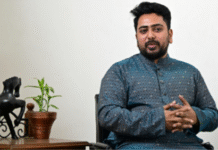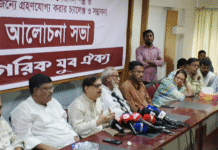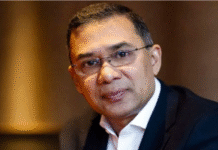
The Nationalist Citizen Party (NCP) has rejected the BNP’s proposal for increasing reserved seats for women, instead advocating for the direct election of at least 100 women from general constituencies to ensure stronger democratic representation.
“Our party’s position supports 25% women’s representation. These women will be elected from general seats. A total of 100 women will be elected,” NCP Joint Convener Tasnim Jara told reporters after the second round of dialogues with the National Consensus Commission at the Foreign Service Academy.
“If women are elected through voting from their own constituencies, they will get a real chance to work and leadership will rise from the grassroots. The procedure can be further discussed. BNP has only proposed to increase the number of reserved seats from 50 to 100. But we want elections instead.”
Nomination system for reserved seats a ‘prize posting’, holds women back from true empowerment: Sarjis
Chief Organiser (North) of NCP Sarjis Alam said the proposal to increase the number of reserved seats for women from 50 to 100 will not lead to empowerment but rather create obstacles.
“Currently, the reserved seats are actually ‘prize postings’. In the past, we have not seen competent individuals being placed in those seats. Often, when someone couldn’t be nominated for another position, the party gave reserved seats to their family members or relatives as a consolation prize. This keeps women away from true empowerment,” he said.
He added, “There is a world of difference between someone rising through elections at the grassroots and someone being given a consolation prize.”
Regarding the amendment of Article 70 of the constitution, Sarjis said his party was in agreement.
“A particular party has demanded inclusion regarding national security and presidential elections. However, we believe that all matters can be related under national security. Through this, the power of MPs to express their opinion will remain restricted.”
Speaking on parliamentary standing committees, Sarjis Alam said, “There has been a consensus to appoint opposition members as chairpersons in four standing committees – Public Accounts, Privileges, Estimates, and Undertakings.
“Besides this, we believe that chairpersons from the opposition can also be appointed in other public-interest sectors like public administration and home affairs. We have suggested that chairperson positions be distributed among various parties proportionally, so that the opposition doesn’t imply just one party.”
Joint Convener Sarwar Tushar noted that there is discussion about what topics will be included in the July Charter, but there has been no discussion on how it will be implemented.
“That’s why we will call for it to be made legally binding through a referendum or some other mechanism.”
The NCP proposed that not only the next national election but also the local government elections be held under a non-party caretaker government.
“Everyone wants the national elections to be held under a non-party neutral government. And it will be better if the local government elections are also held under a non-party neutral government,” said NCP joint convener Sarwar Tusher.
About the tenure of the election-time government, Sarwar said NCP agreed with the proposal of four-month tenure for the election-time caretaker government.
“Some parties support a six-month duration. This matter has not yet been discussed thoroughly. We are flexible about whether the tenure should be three or four months. If the local government elections are included, four months might be necessary,” he said.









